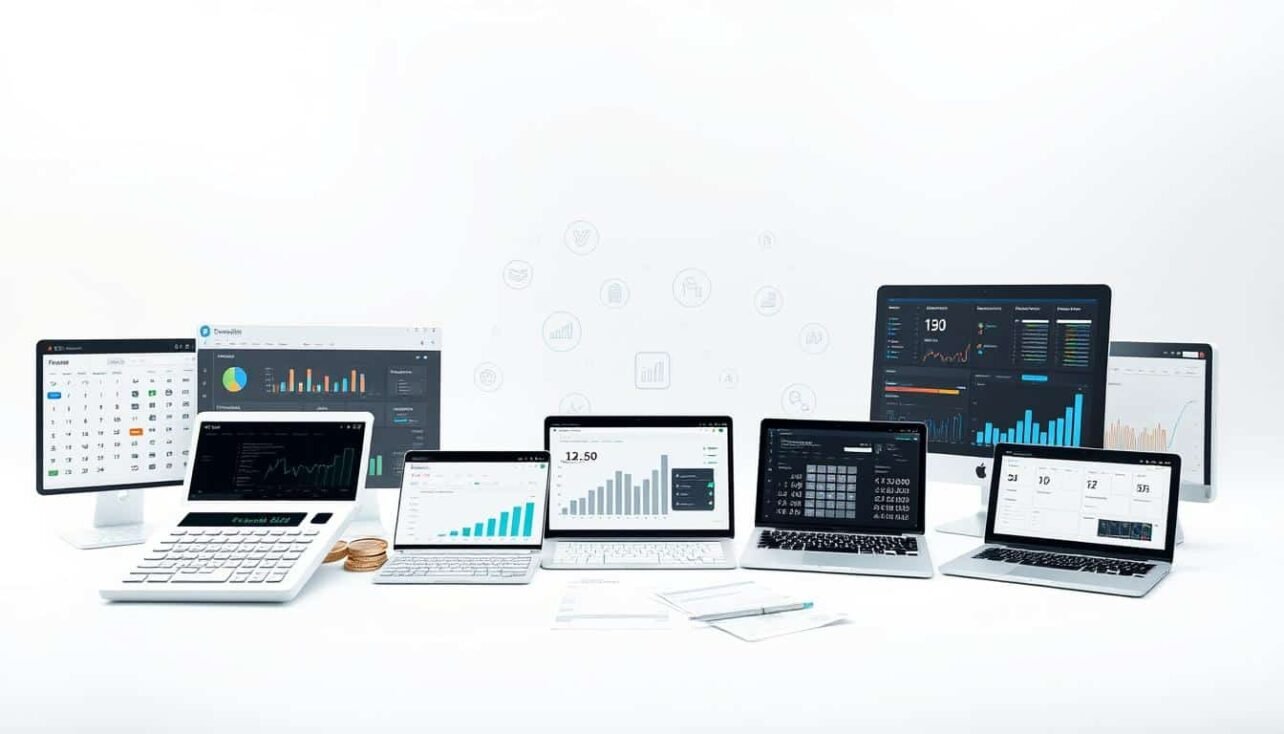Crypto tax calculators are now key for investors dealing with digital asset taxes. As more people invest in cryptocurrencies, the IRS pays closer attention to these transactions. This guide shows how these tools help with reporting, making sure you follow the rules and save on taxes.
Key Takeaways
- Crypto tax calculators automate tracking of trades, sales, and holdings to meet IRS requirements.
- Selecting the right crypto tax solution depends on portfolio size and transaction frequency.
- Accurate records reduce audit risks and potential penalties for unreported gains.
- Top tools integrate with major exchanges, simplifying import of transaction history.
- Compliance requires using software that supports cost basis methods like FIFO or HIFO.
Why Cryptocurrency Tax Reporting Has Become Essential
Crypto tax reporting is now a must for investors. The IRS views cryptocurrencies as taxable property, needing detailed records of all transactions. Since 2014, when Bitcoin was first seen as property, rules have gotten stricter. Today, Form 1040 directly asks if you’ve dealt with virtual currency, showing more attention from the IRS.
The 2022 infrastructure bill made exchanges report customer trades. This means you must keep track of all trades, ails, and airdrops. Not doing so could lead to penalties. For instance, not paying enough taxes can result in fines up to 20% of what you owe for simple mistakes or 75% for fraud, plus interest. Crypto tax software makes this easier by automating records and calculations.
- IRS penalties for non-compliance start at 20% of unpaid taxes for negligence
- Fraud cases face up to 75% penalties plus back taxes and interest
- Exchanges now report transactions under new broker definitions
Ignoring crypto tax reporting can put you in legal trouble and cost you money. Using crypto tax software helps you follow the rules and makes complex tasks simpler. Knowing these rules is key to avoiding audits.
Understanding the Complexity of Crypto Taxation
Crypto transactions are a complex web of tax rules, unlike traditional investments. Every trade, swap, or transfer is a taxable event. To avoid penalties, you must calculate crypto taxes accurately.
Unlike stocks, crypto’s decentralized nature makes tracking harder. For example, swapping Bitcoin for Ethereum is taxable. Holding NFTs as collectibles can lead to higher capital gains rates.
- Trading crypto for fiat or other coins
- Staking rewards classified as income
- Airdrops and hard forks creating taxable assets
- Using crypto to buy goods/services
Keeping track of cost basis across multiple exchanges and wallets is a big challenge. A single DeFi investor might have thousands of micro-transactions each year. This makes manual crypto tax solution tools essential.
Chain splits, like Bitcoin Cash from Bitcoin, require specific cost basis calculations. Even moving crypto between personal wallets can change tax rates. The IRS demands accurate records but offers little guidance.
For more information, check how tax rules apply to yield farming and more. Without automation, mistakes are common, leading to audits or overpayment. This is why specialized software is key for modern investors.
How Crypto Tax Calculators Simplify Your Tax Filing Process
Automated crypto tax calculators turn messy transaction records into easy-to-read tax data. They connect directly to exchanges and wallets, cutting down on manual work. This way, every trade is tracked in real time, making fewer mistakes.

Automating Transaction Tracking Across Exchanges
These tools link up with big names like Coinbase and Binance, getting your transaction data automatically. They sort out buys, sells, and transfers, making a single ledger. No need to juggle spreadsheets anymore—every trade is recorded in one spot.
Calculating Cost Basis and Capital Gains
These tools figure out cost basis using IRS-approved methods like FIFO or HIFO. They split gains into short-term (under a year) and long-term, calculating taxes correctly. This helps users avoid overpaying by finding deductible losses or eligible exemptions.
Generating Tax-Ready Reports for Accountants
Automated systems create the IRS-mandated forms like Form 8949 and Schedule D. Reports can be sent to TurboTax or other software, saving hours of manual work. With audit trails and proof of calculations, following IRS rules is easy, reducing the chance of IRS checks.
Key Features to Look for in Crypto Tax Calculators
Choosing the right crypto tax calculators means looking at key features. These features help you follow the rules easily. Find tools that handle complex deals and keep up with new rules. Compare to pick the best crypto tax tools for your needs.
Exchange Integration Capabilities
Top tools connect with big exchanges like Coinbase and Binance. They use APIs for direct access. Also, they import data from wallets and blockchain explorers. This way, they track every trade, ensuring accuracy during audits.
DeFi and NFT Support
Good crypto tax calculators handle DeFi and NFT activities. They deal with staking on Aave and yield farming on Uniswap. Without DeFi/NFT support, you might miss taxable events.
Tax-Loss Harvesting Tools
Tools that automate tax-loss harvesting find ways to lower your taxes. They figure out the best time to sell to save money. This way, you don’t have to do it all by hand.
Audit Trail Documentation
It’s important to have accurate records of all transactions. Top tools keep track of prices and categorize trades. They also store important details like timestamps and transaction IDs. This meets IRS standards and helps solve data gaps with blockchain analysis.
Top Crypto Tax Calculators for American Investors
Choosing the right crypto tax calculator app is key for following the rules. Here’s a look at the top crypto tax tools for US investors. They focus on features like exchange integration and audit-ready reports:
- CoinTracker: Makes tracking on Coinbase and other exchanges easy. It’s great for beginners and those who trade often.
- CoinLedger: Has strong support for historical data, which is important for older portfolios. It’s also affordable, making it good for mid-sized investors who need IRS audit documents.
- TokenTax: It’s best for advanced users with lots of trades. It automates Form 8949, but setting it up takes some tech know-how.
- Koinly: Works with over 400 exchanges and is easy to use. It tracks cost basis and NFTs, making it a good all-around choice.
- ZenLedger: It’s great for tax-loss harvesting and filing state taxes. It also offers audit support and IRS letter templates for complex portfolios.
Each platform meets different needs. Some are easy to use, while others are for more complex strategies. Look at features like exchange coverage and export options to find the best fit for your portfolio.
Pricing Comparison: Finding the Right Value for Your Portfolio Size
Choosing the best crypto tax solution depends on your investment activity and portfolio size. Automated crypto tax calculators vary widely in cost. They have pricing tiers tailored to different investor needs. Use this guide to match your crypto activity level with the most cost-effective option.
Free Options for Small-Scale Investors
Beginners with under $10,000 in crypto gains can start with free tools like Coinbase Tax Center. These crypto tax calculators track basic transactions but often limit features like NFT support or DeFi integration. Koinly’s free tier supports up to 50 transactions annually, ideal for casual holders.
Mid-Tier Solutions for Active Traders
Mid-range crypto tax solutions like CoinTracking and TokenTax cost $50–$200 annually. These automated crypto tax calculators offer unlimited transactions, DeFi yield tracking, and IRS Form 8949 generation. Compare models charging per-transaction fees vs percentage-of-profit structures to avoid hidden costs.
Enterprise-Grade Options
High-volume investors need premium plans from ZenLedger or CoinTracker Enterprise ($300+).year). These crypto tax solutions include API integrations for institutional exchanges, audit-ready reports, and priority support. Their cost-benefit analysis focuses on time saved avoiding manual reconciliation errors.
Always evaluate multi-year subscription discounts and fee structures. Even “free” crypto tax calculators may charge for advanced exports or customer support. Balancing upfront costs with tax preparation time ensures you select the best value crypto tax solution for your activity level.
Step-by-Step Guide to Setting Up Your First Crypto Tax Calculator
Setting up a crypto tax calculator app is key for accurate tax records. Follow these steps to avoid mistakes:
- Prepare your data: Get API keys from Coinbase and Binance.US. Download CSV transaction histories. Note all wallet addresses.
- Create an account: Sign up for a crypto tax calculator app like Koinly or CoinTracker. Make sure to enable two-factor authentication for security.
- Connect exchanges: Link accounts via API for real-time data from supported platforms. For exchanges not supported, manually upload CSV files.
- Verify wallet addresses: Check all imported wallet addresses to avoid duplicates or missing entries.
During setup, use the app’s tools to:
- Import transactions: Use the app’s interface to sync with exchanges or upload CSV files. Check for missing dates or amounts.
- Correct discrepancies: Use the app’s edit tools to fix misclassified trades or fees. Flag recurring issues like NFT transfers marked as taxable events.
- Generate reports: After finalizing data, use the app to calculate crypto taxes using FIFO/LIFO methods. Export reports in IRS-friendly formats.
- Troubleshooting: For incomplete imports, retry with updated API permissions. Missing transactions? Check exchange export date ranges.
- Key tip: Always review the “transaction history” tab to confirm every trade matches exchange records.
Regularly update the app with new transactions to keep records ready for audits. This initial setup takes 20-30 minutes but saves hours during tax season. Use the app’s help guides for platform-specific setup details.
Advanced Tax Strategies Using Crypto Tax Software
A crypto tax planner turns simple tasks into smart moves. It helps users calculate crypto taxes and find ways to lower their tax bills. Here are three main strategies to use:
Identify Tax-Loss Harvesting Opportunities
- Track underwater positions to sell losses and offset gains, reducing taxable income.
- Software alerts when losses exceed gains, guiding timed sales before year-end.
- Avoid wash sale rules (currently not enforced in crypto but monitor IRS updates).
Optimize Holding Periods for Lower Rates
Hold assets past the 365-day mark to get lower long-term capital gains. A crypto tax planner shows when deadlines are near and how much you can save:
- Compare tax outcomes for selling now vs. waiting weeks.
- Simulate scenarios for complex portfolios with multiple holdings.
Track Deductible Expenses
Capture every expense related to crypto activities:
- Hardware wallets, mining electricity, and software subscriptions qualify as deductions.
- Log educational courses or conferences related to crypto investing.
Keep a record of all expenses in your crypto tax planner to avoid IRS disputes.
Common Mistakes to Avoid When Using Cryptocurrency Tax Tools
Using cryptocurrency tax software wrong can cost you a lot. One big mistake is missing transactions when importing data. For instance, not importing all exchanges or wallets can mess up cost basis calculations.
This can lead to wrong crypto tax reports. The IRS might notice and ask questions.

Another error is not correctly classifying transactions. Staking rewards or airdrops are often seen as sales, not income. This mistake is pointed out by experts at Gordon Law. Also, DeFi swaps and chain splits need to be categorized correctly to avoid paying too much in taxes.
- Ignoring time zones or timestamps can cause trades to be mismatched, making gains seem higher.
- Choosing FIFO or LIFO without following IRS rules can make your tax bill too high.
- Switching accounting methods every year can lead to IRS penalties for not being consistent.
Always check imports manually. Make sure staking rewards are seen as taxable income, not capital gains. Use crypto tax reporting tools that alert you to special cases like hard forks.
Keep records of your method choices every year to avoid audits. Small mistakes in setup can lead to big penalties. Being precise helps you stay compliant and save money.
How Professional Tax Advisors Work With Crypto Tax Calculators
Professional tax advisors use crypto tax tools to make compliance easier. Many crypto tax reporting platforms have features for working together. These tools help advisors see client data safely and keep records ready for audits.
Collaborative Features for Accountant Access
Top cryptocurrency tax software providers have dashboards for multiple users. For example, CoinTracking lets advisors see transaction histories without private keys. This ensures data privacy and accurate calculations.
Exporting Data to Professional Tax Software
Most tools work with big tax platforms. Here’s how:
- Export data in CSV/XML formats for Lacerte, UltraTax, and Drake
- Automate import into tax prep software to cut down on errors
- Check data accuracy with checksum validation systems
When to Consult a Crypto Tax Specialist
Some situations need a crypto tax expert. Look for help if you have:
- Complex NFT or DeFi transaction histories
- Prior audit history or IRS inquiries
- Yearly trades over $500K in volume
Advanced users should check out AI-driven crypto tax solutions for tough cases. Using automated tools with advisor help reduces risks and boosts compliance.
Privacy and Security Considerations for Crypto Tax Software
When using a crypto tax calculator app or solution, keeping your financial data safe is crucial. First, check how the platform accesses your information. APIs usually have read-only permissions, which is safer than uploading all your data. Also, make sure the app encrypts your data both when it’s in transit and when it’s stored.
- Look for certifications: Choose solutions with SOC 2 compliance and regular audits by third parties.
- Data retention policies differ—some apps delete data after tax season, while others keep it forever.
- Turn on two-factor authentication and don’t share API keys with unknown services.
Opt for a crypto tax solution that only collects data needed for calculations. Self-hosted options, like Koinly’s premium plans, give you control over data storage. Always read the privacy policy to see if your data is shared with advertisers or others.
Regularly check the exchanges you’re connected to and remove access from unused apps. Make sure the crypto tax app you choose lets you limit API permissions to certain actions, not your whole account. Remember, security is a team effort—platforms must protect your data, but you must use strong passwords and follow best practices.
Real User Reviews: What Crypto Investors Say About These Tax Solutions
Real-world feedback shows how crypto tax tools really work. People share their experiences on Reddit’s r/BitcoinTax and industry forums. They talk about what works and what doesn’t.

Success Stories and Time-Saving Reports
Many users love best crypto tax tools for saving time. One user said they found $4,500 in lost money thanks to the tool. Others say the reports helped them avoid IRS penalties.
- Time saved: 20+ hours per tax season
- Reclaimed losses via detailed records
- Multi-exchange portfolio support
Common Complaints and Limitations
Despite the good, there are still problems with crypto tax calculators. Some common issues include:
- Calculation errors with DeFi staking rewards
- Slow customer service during peak tax periods
- Import failures for older transactions
User Experience Comparisons
How easy a tool is to use can vary a lot. Koinly gets high marks for its easy imports, but CoinTracking’s mobile app gets mixed reviews. For more info, check out top crypto apps that work with tax tools. Here are some key differences:
- Learning curve: Koinly vs. ZenLedger
- Mobile app reliability
- Dashboard clarity for non-tech users
It’s clear that these tools make tax time easier. But, users should check if the tools support DeFi and if they can handle old data before signing up.
Preparing for the Future of Cryptocurrency Taxation With the Right Tools
As rules for digital assets keep changing, it’s crucial to stay ahead of crypto tax needs. New trends like real-time tax reporting and predictive planning are changing how we handle taxes. Tools like CoinTracking and Koinly now help users see how tax rules might change, preparing them for the IRS.
For the future, crypto tax planners need to keep up with new rules. This includes updates on wash sales and more reporting for DeFi. Platforms with APIs and teams watching Treasury updates help users stay compliant. They also offer alerts and audit trails for when the IRS gets stricter.
Investors should look for platforms that are clear about their plans for new tax laws. TaxBit, for example, helps track expenses and optimize gains. Their dashboards let users plan for different tax scenarios, staying flexible as rules change.
Choosing a crypto tax tool today sets you up for long-term success. Tools that sync data in real-time and offer detailed reporting help users stay ahead. By picking platforms that innovate and stay aware of rules, investors can manage their crypto assets well in a changing world.
FAQ
What are crypto tax calculators?
Crypto tax calculators are tools for cryptocurrency investors. They help track transactions and calculate taxes. This makes tax reporting easier and more accurate.
How do I calculate my crypto taxes?
Use crypto tax calculators to track your transactions. They connect to exchanges and wallets. Then, they calculate gains and losses for tax reports.
What are the best crypto tax tools available in 2023?
In 2023, top crypto tax tools include CoinTracker, Koinly, TokenTax, and ZenLedger. They offer features like exchange integration and tax-loss harvesting. These tools help American investors with their taxes.
Is there a crypto tax calculator app?
Yes, there are mobile apps for crypto tax calculators. They let you track transactions and manage taxes on your phone.
What should I look for in a crypto tax planner?
Look for a crypto tax planner with good exchange integration. It should also support DeFi and NFTs. Features like tax-loss harvesting and audit trails are important for accuracy and compliance.
How can automated crypto tax calculators benefit me?
Automated crypto tax calculators save time and reduce errors. They track transactions and calculate gains automatically. This makes tax reporting easier for your accountant.
What are the potential penalties for crypto tax non-compliance?
Non-compliance can lead to penalties of 20% to 75% of your taxes. Plus, you’ll have to pay interest. It’s important to report your transactions accurately to avoid these penalties.
Can I use crypto tax software for tax-loss harvesting?
Yes, many crypto tax software platforms offer tax-loss harvesting. This feature helps you offset gains with losses to lower your taxes.
How does crypto tax reporting differ from traditional tax filing?
Crypto tax reporting is more complex due to various transaction types. You need to calculate cost basis across multiple exchanges. The rules for digital assets are also changing.
When should I consider consulting a crypto tax specialist?
Consider a crypto tax specialist for complex investments or unusual tax situations. They can help with audits and compliance issues.


No comments yet